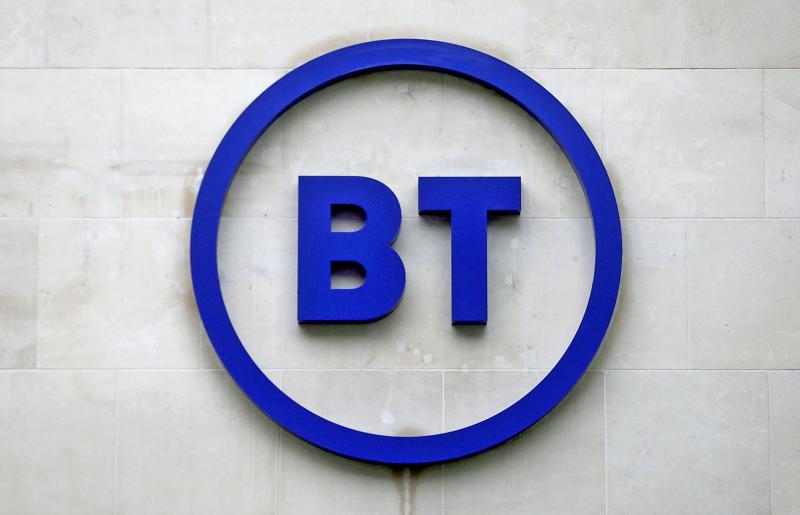Britain’s biggest telecom BT Group PLC has suspended its dividend, one of the biggest on the London Stock Exchange, until the 2021-2022 fiscal year and pulled its financial outlook in response to the COVID-19 pandemic.
The company said that the cash saving would bolster it through the expected financial crash that would lead to lower revenue from sports customers, reduced business activity and more cautious spending by multinational customers.
On the same day that rivals Telefonica SA and Liberty Global PLC announced the merger of their British units to build a stronger challenger, BT also set out plans for a new five-year program to modernize the business.

Photo: Reuters
The new program would cost £1.3 billion (US$1.61 billion) to achieve and would deliver annualized gross benefits of £2 billion by March 2025 as it switches off many legacy programs and uses new technologies to improve.
“Of course, COVID-19 is affecting our business, but the full impact will only become clearer as the economic consequences unfold over the next 12 months,” CEO Philip Jansen said. “Due to COVID-19, BT is not providing guidance for 2020-2021 at this time.”
It said it expected to resume dividend payments at £0.077 per share. In the 2018-2019 fiscal period it paid a full-year dividend of £0.154.
Jansen has been tasked with building nationwide gigabit fixed and mobile networks, while trying to shore up revenue and earnings in the short term.
The company yesterday said that it was working to build its fiber to the home network to 20 million premises by mid to late this year, on the assumption that it secures the right regulatory approval.
It said its 2019-2020 fiscal year results were in line with expectations.
In other news, Telefonica and Liberty Global yesterday announced that their British units — Internet supplier Virgin Media Inc and mobile phone carrier O2 — plan to merge and create a big new telecom provider in the UK.
The parent companies valued the new company at £31 billion.
Telefonica CEO Jose Maria Alvarez-Pallete said that “combining O2’s No. 1 mobile business with Virgin Media’s superfast broadband network and entertainment services will be a game-changer in the UK.”
O2 is the UK’s largest mobile phone company with about 34 million users. Virgin has more than 5 million subscribers to its broadband and cable television services.
Additional reporting by AP

Taiwan Semiconductor Manufacturing Co (TSMC, 台積電), the world’s biggest contract chipmaker, booked its first-ever profit from its Arizona subsidiary in the first half of this year, four years after operations began, a company financial statement showed. Wholly owned by TSMC, the Arizona unit contributed NT$4.52 billion (US$150.1 million) in net profit, compared with a loss of NT$4.34 billion a year earlier, the statement showed. The company attributed the turnaround to strong market demand and high factory utilization. The Arizona unit counts Apple Inc, Nvidia Corp and Advanced Micro Devices Inc among its major customers. The firm’s first fab in Arizona began high-volume production

VOTE OF CONFIDENCE: The Japanese company is adding Intel to an investment portfolio that includes artificial intelligence linchpins Nvidia Corp and TSMC Softbank Group Corp agreed to buy US$2 billion of Intel Corp stock, a surprise deal to shore up a struggling US name while boosting its own chip ambitions. The Japanese company, which is adding Intel to an investment portfolio that includes artificial intelligence (AI) linchpins Nvidia Corp and Taiwan Semiconductor Manufacturing Co (TSMC, 台積電), is to pay US$23 a share — a small discount to Intel’s last close. Shares of the US chipmaker, which would issue new stock to Softbank, surged more than 5 percent in after-hours trading. Softbank’s stock fell as much as 5.4 percent on Tuesday in Tokyo, its

The prices of gasoline and diesel at domestic fuel stations are to rise NT$0.1 and NT$0.4 per liter this week respectively, after international crude oil prices rose last week, CPC Corp, Taiwan (台灣中油) and Formosa Petrochemical Corp (台塑石化) announced yesterday. Effective today, gasoline prices at CPC and Formosa stations are to rise to NT$27.3, NT$28.8 and NT$30.8 per liter for 92, 95 and 98-octane unleaded gasoline respectively, the companies said in separate statements. The price of premium diesel is to rise to NT$26.2 per liter at CPC stations and NT$26 at Formosa pumps, they said. The announcements came after international crude oil prices

SETBACK: Apple’s India iPhone push has been disrupted after Foxconn recalled hundreds of Chinese engineers, amid Beijing’s attempts to curb tech transfers Apple Inc assembly partner Hon Hai Precision Industry Co (鴻海精密), also known internationally as Foxconn Technology Group (富士康科技集團), has recalled about 300 Chinese engineers from a factory in India, the latest setback for the iPhone maker’s push to rapidly expand in the country. The extraction of Chinese workers from the factory of Yuzhan Technology (India) Private Ltd, a Hon Hai component unit, in southern Tamil Nadu state, is the second such move in a few months. The company has started flying in Taiwanese engineers to replace staff leaving, people familiar with the matter said, asking not to be named, as the